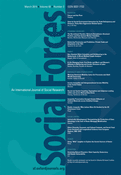-
Views
-
Cite
Cite
Robin D. Moremen, Epidemic City: The Politics of Public Health in New York By James Colgrove Russell Sage Foundation. 2011. 360 pages. $29.95 paper, Social Forces, Volume 93, Issue 3, March 2015, Page e85, https://doi.org/10.1093/sf/sos143
Close - Share Icon Share
Extract
Historian James Colgrove's intriguing book Epidemic City: The Politics of Public Health in New York is an inviting read for sociologists. Indeed, Colgrove appears to be a historian in sociologist's clothing. His story unfolds across four decades (mid-1960s to mid-2000s) and offers an insightful, sometimes searing, critique of public health in action. Situated in New York City, the richness and diversity of the five boroughs jumps off every page, but the tale is anything but local. It is uniquely American, replete with tensions between public and private, prevention and cure, collective responsibility and individual rights, missed opportunities and serendipitous triumphs. The details are meticulously footnoted (in fact, the notes and references make up the last fifth of the book), but the prose itself is uncluttered and highly readable. The narrative unfolds both chronologically and thematically, synthesizing a dialectic between temporal linearity and the nonlinear vicissitudes of politics, economics, interest groups, bureaucracies and emerging crises.



